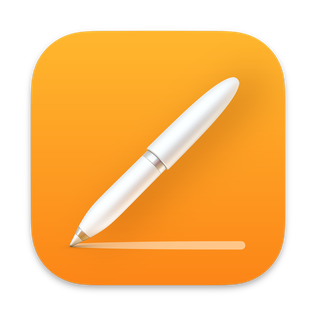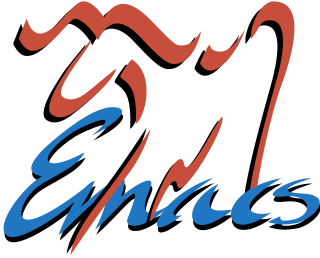
Microsoft Word is a word processing software developed by Microsoft. It was first released on October 25, 1983, under the name Multi-Tool Word for Xenix systems. Subsequent versions were later written for several other platforms including: IBM PCs running DOS (1983), Apple Macintosh running the Classic Mac OS (1985), AT&T UNIX PC (1985), Atari ST (1988), OS/2 (1989), Microsoft Windows (1989), SCO Unix (1990), macOS (2001), Web browsers (2010), iOS (2014) and Android (2015). Using Wine, versions of Microsoft Word before 2013 can be run on Linux.

SimpleText is the native text editor for the Apple classic Mac OS. SimpleText allows text editing and text formatting, fonts, and sizes. It was developed to integrate the features included in the different versions of TeachText that were created by various software development groups within Apple Computer.

A text editor is a type of computer program that edits plain text. Such programs are sometimes known as "notepad" software. Text editors are provided with operating systems and software development packages, and can be used to change files such as configuration files, documentation files and programming language source code.

Vim is a free and open-source, screen-based text editor program. It is an improved clone of Bill Joy's vi. Vim's author, Bram Moolenaar, derived Vim from a port of the Stevie editor for Amiga and released a version to the public in 1991. Vim is designed for use both from a command-line interface and as a standalone application in a graphical user interface.

WordPerfect (WP) is a word processing application, now owned by Corel, with a long history on multiple personal computer platforms. At the height of its popularity in the 1980s and early 1990s, it was the dominant player in the word processor market, displacing the prior market leader WordStar.

WordStar is a word processor application for microcomputers. It was published by MicroPro International and originally written for the CP/M-80 operating system, and later written also for MS-DOS and other 16-bit PC OSes. Rob Barnaby was the sole author of the early versions of the program. Starting with WordStar 4.0, the program was built on new code written principally by Peter Mierau. WordStar dominated the market in the early and mid-1980s, succeeding the market leader Electric Pencil.

Windows Notepad is a simple text editor for Windows; it creates and edits plain text documents. First released in 1983 to commercialize the computer mouse in MS-DOS, Notepad has been part of every version of Windows ever since.

LyX is an open source, graphical user interface document processor based on the LaTeX typesetting system. Unlike most word processors, which follow the WYSIWYG paradigm, LyX has a WYSIWYM approach, where what shows up on the screen roughly depicts the semantic structure of the page and is only an approximation of the document produced by TeX.

GNU TeXmacs is a scientific word processor and typesetting component of the GNU Project. It originated as a variant of GNU Emacs with TeX functionalities, though it shares no code with those programs, while using TeX fonts. It is written and maintained by Joris van der Hoeven and a group of developers. The program produces structured documents with a WYSIWYG user interface. New document styles can be created by the user. The editor provides high-quality typesetting algorithms and TeX and other fonts for publishing professional looking documents.

Syntax highlighting is a feature of text editors that are used for programming, scripting, or markup languages, such as HTML. The feature displays text, especially source code, in different colours and fonts according to the category of terms. This feature facilitates writing in a structured language such as a programming language or a markup language as both structures and syntax errors are visually distinct. This feature is also employed in many programming related contexts, either in the form of colorful books or online websites to make understanding code snippets easier for readers. Highlighting does not affect the meaning of the text itself; it is intended only for human readers.

BBEdit is a proprietary text editor made by Bare Bones Software, originally developed for Macintosh System Software 6, and currently supporting macOS.

A source-code editor is a text editor program designed specifically for editing source code of computer programs. It may be a standalone application or it may be built into an integrated development environment (IDE) or web browser. Source-code editors are a fundamental programming tool, as the fundamental job of programmers is to write and edit source code.

Pages is a word processor developed by Apple Inc. It is part of the iWork productivity suite and runs on the macOS, iPadOS and iOS operating systems. It is also available on iCloud on the web. The first version of Pages was released in February 2005. Pages is marketed by Apple as an easy-to-use application that allows users to quickly create documents on their devices. A number of Apple-designed templates comprising different themes are included with Pages.
This article provides basic comparisons for notable text editors. More feature details for text editors are available from the Category of text editor features and from the individual products' articles. This article may not be up-to-date or necessarily all-inclusive.
A collaborative real-time editor is a type of collaborative software or web application which enables real-time collaborative editing, simultaneous editing, or live editing of the same digital document, computer file or cloud-stored data – such as an online spreadsheet, word processing document, database or presentation – at the same time by different users on different computers or mobile devices, with automatic and nearly instantaneous merging of their edits.
Sprint is a text-based word processor for MS-DOS, first published by Borland in 1987.

AtariWriter is a word processor program for the Atari 8-bit family released by Atari as a 16 kB ROM cartridge in 1983. The program was fast and easy to use, while still allowing the creation of fairly complex documents. It was a huge success for the platform, with at least 800,000 examples sold not including international versions and later updates.

GNU Emacs is a free software text editor. It was created by GNU Project founder Richard Stallman, based on the Emacs editor developed for Unix operating systems. GNU Emacs has been a central component of the GNU project and a flagship project of the free software movement. Its name has occasionally been shortened to GNUMACS. The tag line for GNU Emacs is "the extensible self-documenting text editor".

Emacs, originally named EMACS, is a family of text editors that are characterized by their extensibility. The manual for the most widely used variant, GNU Emacs, describes it as "the extensible, customizable, self-documenting, real-time display editor". Development of the first Emacs began in the mid-1970s, and work on its direct descendant, GNU Emacs, continues actively; the latest version is 28.2, released in September 2022.

Google Docs is an online word processor included as part of the free, web-based Google Docs Editors suite offered by Google, which also includes: Google Sheets, Google Slides, Google Drawings, Google Forms, Google Sites and Google Keep. Google Docs is accessible via an internet browser as a web-based application and is also available as a mobile app on Android and iOS and as a desktop application on Google's ChromeOS.















